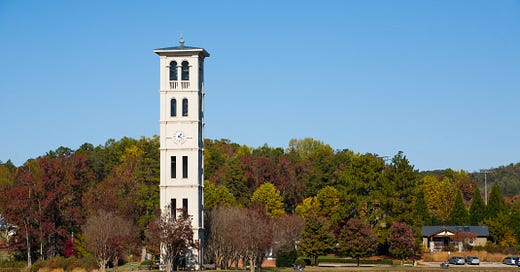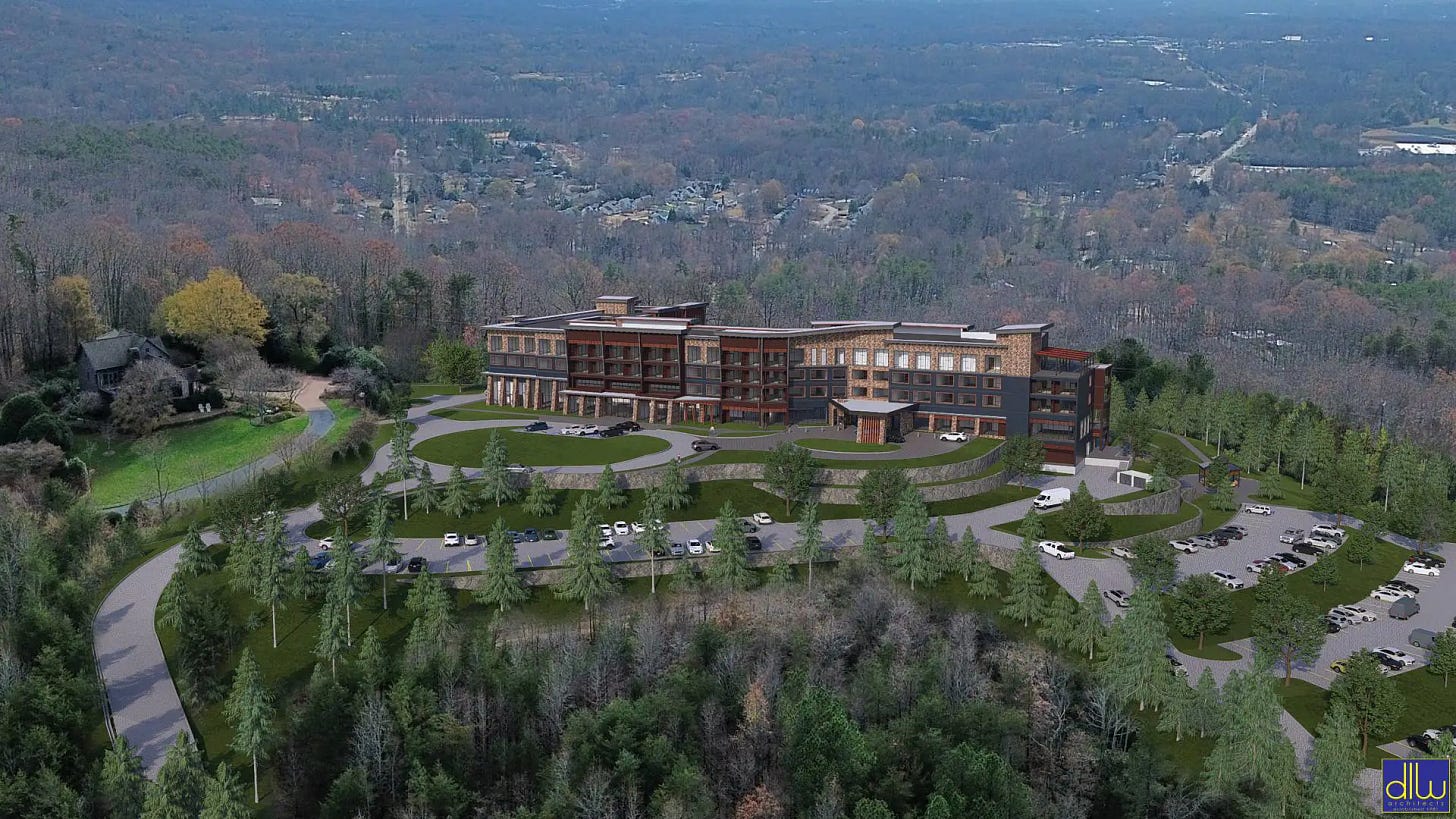Continued Commitment to Hurricane Cleanup, Smarter Development, and The Importance of Community Action in Greenville County
Councilman Blount’s Newsletter 2-2-25
As we kick off another week in Greenville County, there’s a lot happening—from upcoming council meetings to ongoing recovery efforts after Hurricane Helene. This week’s newsletter highlights key events, important discussions, and ways you can stay engaged in shaping our community’s future.
Upcoming Greenville County Meetings
Stay engaged with your local government! Here are the key meetings happening this week:
County Council & Committees
📌 Monday, Feb 3
• Planning & Development Committee – 5:00 PM
📌 Tuesday, Feb 4
• Roads, Infrastructure & Public Works Committee – 3:00 PM
• Committee of the Whole – 3:30 PM
• County Council Meeting – 6:00 PM
Ongoing Debris Cleanup Efforts Following Hurricane Helene
In the aftermath of Hurricane Helene, Greenville County remains committed to restoring our community through extensive debris removal operations. Our dedicated crews are working tirelessly to ensure all areas are cleared and safe for residents.
Current Progress:
Debris Collection: To date, the County has collected nearly 855,000 cubic yards of debris, and we anticipate surpassing 1 million cubic yards before the job is complete.
Operational Commitment: Crews are operating seven days a week with more than 60 trucks in service to expedite the cleanup process.
Large Stump Removal: Specialized equipment, including unique machinery and flatbeds, has been deployed to handle the removal of large stumps, enhancing our capacity to clear substantial debris effectively.
How You Can Assist:
Debris Placement: Please stack hurricane-related debris on the right-of-way in front of your home, specifically the area that extends from the street to the sidewalk, ditch, utility pole, or easement. Avoid placing debris in the roadway, in front of fire hydrants or mailboxes, under power lines, or near vehicles and other structures.
Reporting Debris: If you encounter debris piles on county-owned roadways, please report them by emailing debris@greenvillecounty.org. Your assistance is invaluable in helping us identify and address areas in need of attention.
The Power of Community: Finding a kidney for Jeff Leopard
A few days ago, in the midst of a difficult day dealing with my mother’s ongoing health issues, I came across something that put everything into perspective—a simple message on the side of a Jeep: “HUBBY NEEDS A KIDNEY”
It was a reminder that while I was feeling overwhelmed, others were also carrying unimaginable burdens. So, I shared the message on social media, hoping that someone, somewhere, might see it and be able to help.
I never expected what happened next. The media picked up the story, and now, Jeff’s fight for a kidney is reaching even more people. To see the public and the press rally around this family, to see people take the time to spread awareness, is proof of what can happen when we look out for one another.
This isn’t about a post—it’s about what we can accomplish when we come together. Every share, every conversation, and every act of kindness can make a difference. It’s more proof that when we lift each other up, incredible things can happen.
If you or someone you know might be able to help, please reach out. The contact number for the family seeking a live donor is (864-660-9417).
You can also read more about his story here
Final Three Standing Committees Announced for Greenville County Council
As Greenville County Council moves forward into 2025, the final three standing committees have been set, rounding out the leadership teams that will shape policy decisions in key areas. These committees play a crucial role in handling county business, and I wanted to make sure you have a clear picture of who will be leading the discussions on some of the most important issues facing our community.
Communications and Government Affairs
This committee will focus on how the county engages with the public and coordinates with state and federal governments. From transparency efforts to legislative advocacy, these members will be at the forefront:
Frank Farmer (Chair)
Rick Bradley
Kelly Long
Liz Seman
Dan Tripp
As the newly appointed Chairman of the Communications and Government Affairs Committee, Frank Farmer brings a unique blend of military discipline, local roots, and a commitment to transparency to Greenville County Council.
Born and raised in Greenville, Frank has an intrinsic understanding of the community’s values and needs. His deep connection to the area ensures that he can effectively communicate and advocate for residents interests.
Frank’s five-year service in the U.S. Army instilled in him a strong sense of duty, leadership, and strategic communication skills. These attributes are essential for effectively managing governmental affairs and fostering clear communication channels.
Frank’s combination of local knowledge, disciplined leadership, and dedication to open communication makes him an excellent choice to lead the Communications and Government Affairs Committee, fostering effective dialogue between the council and the community.
Public Safety
Tasked with overseeing law enforcement, emergency response, and other public safety matters, this committee will work to ensure the protection and well-being of Greenville County residents:
Garey Collins (Chair)
Steve Shaw
Joey Russo
Frank Farmer
Dan Tripp
Garey Collins brings a lifetime of leadership, service, and problem-solving to his role as Chairman of the Public Safety Committee.
Garey served 20 years in the U.S. Air Force and Army National Guard, working in aircraft maintenance, recruiting, and leadership across 120 countries. His time in the military required discipline, crisis management, and strategic planning, all essential for handling public safety matters.
Since retiring in 2006, Garey has dedicated himself to service, working with the SC Foster Care Review Board, mentoring special needs students, officiating sports, and volunteering with local organizations. His hands-on involvement in the community gives him firsthand insight into the needs of Greenville residents.
Garey’s military discipline, leadership experience, and deep commitment to the community make him an excellent choice to lead the Public Safety Committee, ensuring Greenville County remains safe, well-prepared, and responsive to its residents needs.
Finance Committee
Finance will oversee the county’s budget, spending priorities, and fiscal policies. The members responsible for these critical decisions are:
Benton Blount (Chair)
Garey Collins
Kelly Long
Joey Russo
Frank Farmer
Update
After publishing this newsletter, Councilman Steve Shaw declined my appointment for him to serve as Finance Committee Chair. While I respect his decision, I remain committed to ensuring responsible financial oversight for Greenville County.
Having served on the Finance Committee for the past two years, I will be stepping into the role of Chair—at least for now—to ensure continuity and stability in our county’s fiscal management. I look forward to working with my colleagues to maintain transparency, accountability, and sound financial stewardship for the citizens of Greenville County.
As always, my focus remains on serving you with integrity, and I welcome your input as we navigate the financial decisions that impact our community.
Annexation, Zoning, and the Proposed Inn at Altamont
A new 150-room luxury resort, The Inn at Altamont, has been proposed in Travelers Rest. This project could bring increased tourism, job opportunities, and tax revenue, but like any major development, it also comes with concerns particularly regarding zoning, infrastructure, and how decisions like this are made.
Read about the proposed project here: The Inn at Altamont
Even though this is not in District 19, rather a close neighbor—As your representative, I believe the most important thing I can do is ensure that you have all the information—not just about this project, but about the broader issues at play. Understanding how annexation works, why zoning changes happen, and how decisions impact the community is key to making sure your voice is heard.
Current Constituent Concerns
The following are some of the most discussed topics concerning the potential annexation that have landed in my inbox, voicemail, and text message:
1. Loss of Environmental Protections
The ESD-PM zoning limits development to low-density residential use, ensuring that new projects blend with the natural landscape. If Travelers Rest rezones the area to allow a hotel, it could set a dangerous precedent for further commercial expansion.
2. Traffic Congestion & Infrastructure Strain
Paris Mountain Road and Altamont Road are already struggling with increased traffic and wear. Even with an entrance on Old Buncombe Rd, a major hotel would bring hundreds of additional cars daily, putting stress on roadways never designed for high-volume commercial use.
3. Impact on Property Owners & Residents
Many people moved to the Paris Mountain area specifically because of its protected status under Greenville County zoning. If this annexation goes through, they could see their quiet residential community transformed into a commercial hub with no say in the matter.
4. Risk of Future Overdevelopment
If the City of Travelers Rest approves this hotel, what’s stopping them from annexing even more of Paris Mountain for commercial use? This move could set a precedent that weakens environmental protections across the entire region.
How Annexation Affects Development
In South Carolina, annexation laws give cities the ability to expand their borders as long as the property being annexed is contiguous to the city even if that connection is just the centerline of a road. This means that if a property owner wants to develop their land in a way that conflicts with county zoning rules, they may have the option to annex into a city that has different regulations.
For example, if a county’s zoning limits density or enforces environmental protections, but a municipality allows for more flexibility, a property owner can choose to petition for annexation to bypass county restrictions. Once annexed, the city not the county determines what can be built on the land.
This isn’t necessarily good or bad. It depends on the specifics of the project and how it fits into the broader vision for the community. But it does highlight an important reality: annexation often shifts decision-making power from one governing body to another, which can leave some residents feeling confused and unheard.
Why This Conversation Matters
This is bigger than just one project. Greenville County is growing, and annexation is an ongoing issue that affects how that growth is managed. While municipalities have the ability to expand, counties have limited tools to influence or prevent annexation, even when it impacts local infrastructure, environmental planning, or land use.
Many people don’t realize that there is no county approval process for annexations. If a property meets the legal requirements for annexation, it’s ultimately up to the property owner and the municipality, not the county or its residents.
This is why some advocate for annexation reform, not necessarily to stop annexations, but to create a process where counties have more input when those decisions could impact surrounding areas.
How You Can Get Involved
Whether you support or oppose this project, the most important thing you can do is stay informed and participate in the process. There is an upcoming meeting where you can learn more and share your perspective:
Monday, February 10th - Public Information Session
6:00 PM - 8:00 PM
Young’s Conference Center, Furman University
Attending this meetings will give you the opportunity to ask questions, hear from developers and officials, and understand how this project might impact the community.
If you have concerns, here are a few steps you can take:
Ask questions at these meetings about traffic, infrastructure, environmental impact, and long-term planning.
Talk to your local officials both county and city representatives about your thoughts.
Stay informed about similar developments and how they impact Greenville County’s future.
At the end of the day, there is nothing more powerful than an informed public. My goal is to make sure you have the facts, understand the process, and know how to make your voice heard, because the more engaged we are as a community, the better the outcomes will be for everyone.
Councilman’s Corner: A Smarter Path Forward for Growth
Disclaimer: The following is just my personal opinion. I fully acknowledge that some of these ideas might be “pie in the sky” thinking—but hey, who doesn’t love a good pie?
Greenville County is at a crossroads. Rapid growth has fueled economic opportunity, yet it has also put immense pressure on the rural communities that define much of our county’s character. As more people move here, the demand for housing and infrastructure intensifies. But how do we ensure that growth is not only sustainable but also respects the deep-rooted values of those who cherish our rural landscapes and historical sites?
The reality is that poorly managed sprawl threatens to erode the very things that make Greenville special. Farmland is disappearing at an alarming rate, traffic congestion is worsening, and historical sites are being overshadowed by unchecked development. Many citizens feel unheard as their way of life is gradually being reshaped without their input. Their concerns aren’t about resisting progress; they’re about ensuring that the county’s leadership makes thoughtful decisions that don’t sacrifice our past for an unsustainable future.
This is one of several reasons why I was adamant about putting a pause on the Unified Development Ordinance (UDO). We cannot afford to rush into policies that don’t fully consider the long-term impacts on our communities. As council prepares to revisit the ordinance before a final vote, I will continue pushing for a stronger focus on key areas like urban growth boundaries, infrastructure-first planning, and meaningful citizen engagement.
Urban Growth Boundaries: A Smarter Way to Manage Expansion
Greenville County has taken some steps to guide development, but without clearer boundaries, sprawl continues to erode our rural areas. One way to address this challenge is by strengthening and formalizing urban growth boundaries (UGBs)—geographic limits that direct dense development toward municipalities while preserving open space and farmland.
Currently, some zoning regulations and conservation initiatives provide a degree of protection, but they are often reactive rather than proactive. A well-defined UGB would reinforce existing policies by establishing clear limits on where higher-density development can occur—steering it toward areas already equipped with infrastructure while preventing unchecked sprawl into rural communities. This approach has been successfully implemented in cities across the country, helping to balance growth without sacrificing the unique character of rural landscapes.
A strong UGB policy would ensure that:
• Rural communities remain protected from piecemeal rezoning that gradually chips away at farmland and open space.
• Infrastructure investments are more efficient, prioritizing areas that already have roads, utilities, and emergency services instead of stretching resources thin.
• Municipalities take the lead on density, focusing growth in cities and towns where mixed-use development, transit, and walkability can thrive.
By reinforcing urban growth boundaries, Greenville County can take a more deliberate approach to development—supporting growth in the right places while preserving the rural lifestyle that so many residents are fighting to protect.
A More Thoughtful Approach to Growth
Rather than forcing density into rural areas where it disrupts established communities, Greenville County must embrace a more deliberate, strategic approach—one that prioritizes:
• Smart Infill Development: Instead of sprawling into rural areas, growth should be encouraged within municipalities where infrastructure already exists. Cities like Greenville, Mauldin, and Simpsonville have the potential to absorb more density through mixed-use developments, walkable neighborhoods, and well-planned urban infill. Supporting these efforts can reduce strain on rural lands while still accommodating population growth.
• Infrastructure-First Planning: Before approving large-scale developments in unincorporated areas, the county must ensure that roads, schools, and emergency services can handle the increased demand. Too often, infrastructure lags behind development, creating long-term problems that are expensive to fix.
• Meaningful Citizen Engagement: Residents should have a stronger voice in shaping Greenville’s future. That means more than just public hearings—it means proactive outreach, town halls, and community-driven planning sessions that truly incorporate citizen input into zoning and land-use decisions.
Sustainable growth is possible, but only if we are intentional about where and how we build. By preserving rural areas while directing density toward municipalities that are better equipped to handle it, we can strike a balance that benefits everyone—protecting what makes Greenville County unique while preparing for a thriving future.
I hope you all have an amazing, blessed, and prosperous week!
Now, if you’ll excuse me, I’m off to grab a slice of pie.






I really thank you, Benton. You heading us in the correct direction.
I echo April Moseley's comment down below.
Thank you for taking the time and effort to explain these issues in an easy to understand manner. Too often government issues become bogged down into ‘bureaucracy-speak’ with terms and acronyms that the general public (myself included) are unfamiliar with. I appreciate your dedication to helpfully clarify and educate.✌🏻